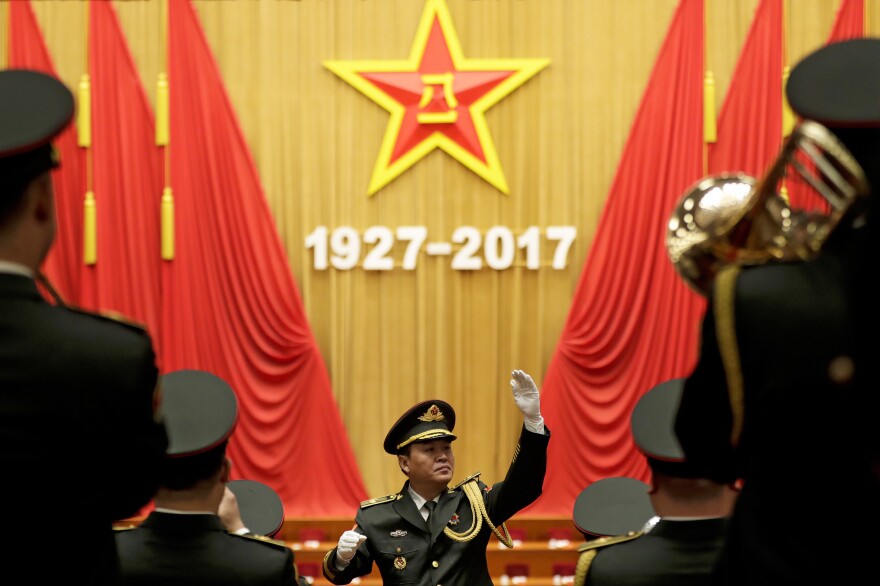Chinese President Xi Jinping and many of the country's highest officials gathered Tuesday in Beijing to celebrate the 90th anniversary of the People's Liberation Army — and to offer two strongly worded reminders to watchers at home and abroad: China's armed forces serve at the will of the Communist Party, Xi said, and those armed forces are prepared to protect the country's territorial interests.
"The Chinese people love peace. We will never seek aggression or expansion, but we have the confidence to defeat all invasions," Xi told his audience in the Great Hall of the People, a ritzy party landmark built under founder Mao Zedong, according to state-run media agency Xinhua. "We will never allow any people, organization or political party to split any part of Chinese territory from the country at any time, in any form."
What went unspoken in Xi's speech was the dispute unfolding now over what, precisely, actually constitutes Chinese territory in its surrounding seas. For years — and as recently as last week — China, its neighbors and their allies have traded harsh words and adopted aggressive postures in pressing their competing claims in the East and South China seas.
A tribunal in the Hague last year invalidated China's expansive territorial claims in the region — a decision China rejected as it has continued to build up its military presence on and around a series of disputed island chains.
Speaking two days after a military parade showcased some 12,000 troops and more than 100 aircraft, Xi emphasized that the PLA must be prepared to protect Chinese priorities.
"No one should expect us to swallow bitter fruit that is harmful to our sovereignty, security or development interests," he said.

To this emphasis Xi added another, no less tied to his political future.
"To build a strong military, [we] must unswervingly adhere to the Party's absolute leadership over the armed forces, and make sure that the people's army always follows the Party," said Xi, who also serves as the Communist Party's general secretary. "No matter how times develop and how circumstances change, this army of ours will always remain one of the Party and one of the people."
For all its repetition in Xi's speech Tuesday, the point is not a new one for Chinese leadership — as Xi himself noted: "As comrade Mao Zedong once pointed out: 'Our principle is that the party commands the gun, and the gun must never be allowed to command the party.' "
But as with Xi's comments on military preparedness, some observers heard a telling subtext.
"What he is saying, technically, is nothing new. The PLA has always been the military wing of the Communist party," Steve Tsang, head of the SOAS China Institute, tells The Guardian.
"But it is blatantly obvious to everybody within the party that this emphasis on loyalty to the party — which doesn't need to be emphasized since it has always been the case — is sending a message that he now has the military fully under his control and that they are loyal to the leadership, of which he is the core."
China is approaching its Communist Party congress this fall, a relatively rare and politically paramount event that will decide party leadership for years to come. Xi is highly likely to win a second five-year term as president at the gathering. But as Reuters notes, Xi has targeted the military as part of his anti-corruption purges, helping to strengthen his hand with its senior ranks.
Tsang says this context lends Xi's remarks another layer of meaning.
"It's a signal to the rest of the establishment: 'I'm building up momentum ... there is no reason for anyone to get hurt. Just be good party members and support your leadership.' "
Copyright 2020 NPR. To see more, visit https://www.npr.org.



